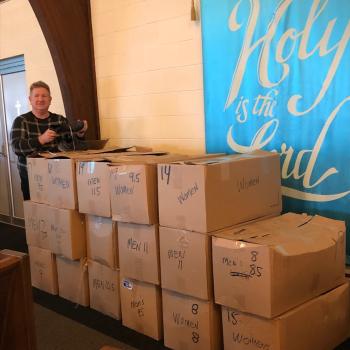
Scripture: Lamentations, chapters 3-5; Revelation, chapter 15
Lamentations 3:1-23 (NASB) – I am a man who has seen misery because of the rod of His wrath. He has driven me and made me walk in darkness and not in light. Indeed, He has turned His hand against me repeatedly all the day. He has consumed my flesh and my skin, He has broken my bones. He has besieged and surrounded me with bitterness and hardship. He has made me live in dark places, like those who have long been dead. He has walled me in so that I cannot go out; He has made my chain heavy. Even when I cry out and call for help, He shuts out my prayer. He has blocked my ways with cut stone; He has twisted my paths. He is to me like a bear lying in wait, like a lion in secret places.
He has made my ways deviate, and torn me to pieces; He has made me desolate. He bent His bow and took aim at me as a target for the arrow. He made the arrows of His quiver enter my inward parts. I have become a laughingstock to all my people, their song of ridicule all the day. He has filled me with bitterness, He has made me drink plenty of wormwood. He has also made my teeth grind with gravel; He has made me cower in the dust. My soul has been excluded from peace; I have forgotten happiness. So I say, “My strength has failed, and so has my hope from the Lord.”
Remember my misery and my homelessness, the wormwood and bitterness. My soul certainly remembers, and is bent over within me. I recall this to my mind, therefore I wait. The Lord’s acts of mercy indeed do end, for His compassions do not fail. They are new every morning; great is Your faithfulness.
Observations: The word “lamentation” means to mourn or express grief. It is a noun form of the verb “lament.” The book entitled “Lamentations” contains a series of Jeremiah’s laments about what God had done to Jeremiah, to the people of Judah, and to the city of Jerusalem. In fact, in the NASB text the book is entitled “The Lamentations of Jeremiah.” Reading today’s passage, it’s not hard to see why!
If we didn’t know the backstory, we might think that Jeremiah was a whiner. The first part of today’s passage (verses 1-18) sounds like a giant “pity party.” Consider these statements:
I am the man who has seen misery
He has turned His hand against me repeatedly all the day
He has besieged and surrounded me with bitterness and hardship
Even when I cry out and call for help, He shuts out my prayer
He has blocked my ways with cut stone; He has twisted my paths
He bent His bow and took aim at me as a target for the arrow
He has filled me with bitterness
He has made me cower in the dust
My soul has been excluded from peace
Wow! No matter how bad things might have been, I don’t think I’ve ever described my lot like that!
We need to remember two things as we read passages like this. First, the Bible gives us this language to help us express ourselves in times of grief. God is not afraid of our pain, our frustration, and even our anger.
But the second thing we need to remember is to not stop reading too soon! In spite of all that Jeremiah had experienced, He doesn’t stop with verse 18. Instead, he says, “I recall this to mind, therefore I wait. The Lord’s acts of mercy indeed do not end, for His compassions do not fail. They are new every morning; great is Your faithfulness” (vv 21-23, emphasis added). Faith tells us that even when circumstances seem against us, God is for us!
Application: Two observations lead me to two applications. First, because God has given us language to express our sorrow, we should not be afraid to come to Him in our grief. When life deals us difficulties, Satan tries to convince us to abandon our faith. I can’t tell you how many people I’ve heard say things like this: “Well, if that’s the way God is going to be, then I guess I’ll do it my way.” Even worse: “I can’t believe in a God who would allow things like this to happen.” Any “faith” that demands that things be perfect in our lives is no faith at all. If God guaranteed pleasure and comfort in this world, who wouldn’t believe?
That leads me to the second application. Real faith is able to say, even in the midst of struggle: “The Lord’s acts of mercy indeed do not end.” As the words of the old hymn remind us: “Great is Thy faithfulness, great is Thy faithfulness. Morning by morning, new mercies I see. All I have needed Thy hand hath provided. Great is Thy faithfulness, Lord, unto me.”
This is not something that is hidden in Scripture. It’s not a concept that we only find in Lamentations. Job said, “Though He slay me, yet I will trust Him” (Job 13:15). James encourages us to consider it joy when we face trials (James 1:2). The early believers rejoiced that they were counted worthy to suffer for the name of Jesus (Acts 5:41). Instead of expecting (demanding?) that God make us “happy,” we need to learn to find His new mercies each day.
Prayer: Father, if we are honest we will acknowledge that You have been far more gracious to us than we could ever reasonably expect. The difficult times seem so bad because they are in contrast to the numerous times when we experience your mercy and your faithfulness. Help us to remember to look for You in the midst of every event of our lives. Give us the faith to declare, like Jeremiah: “I recall this to mind, therefore I wait. The Lord’s acts of mercy indeed do not end, for His compassions do not fail. They are new every morning; great is Your faithfulness.” Amen.
















